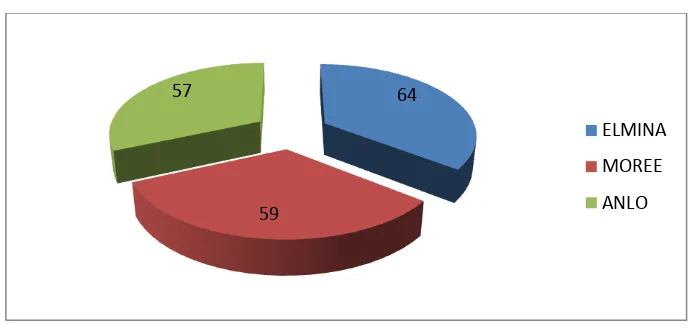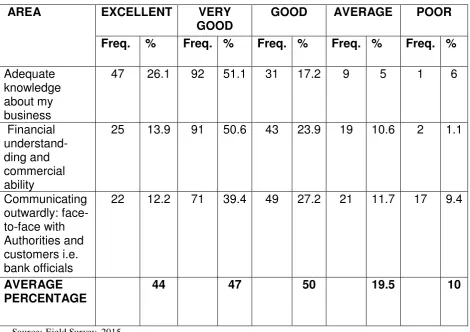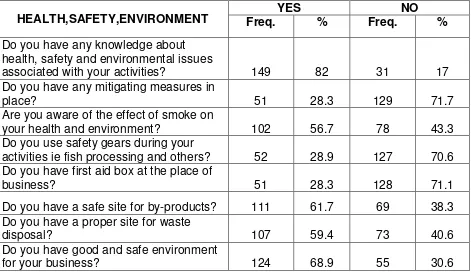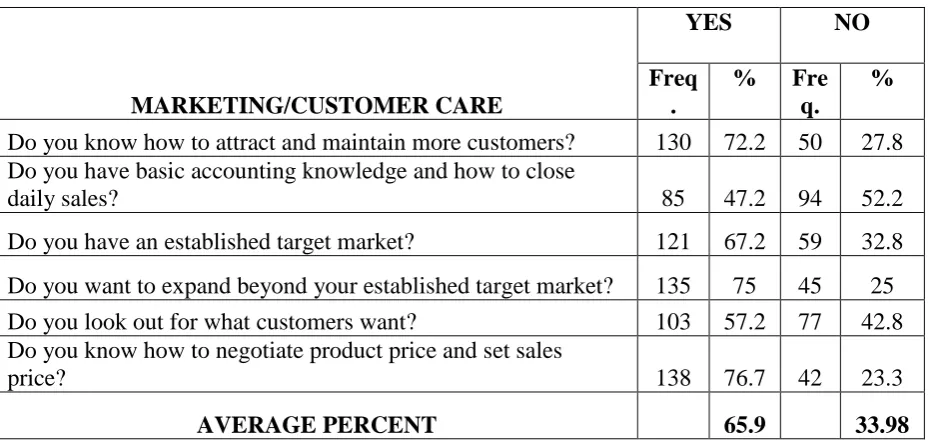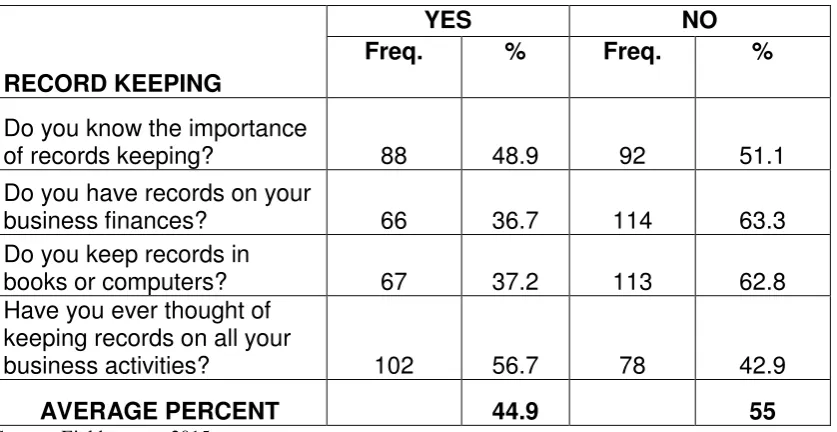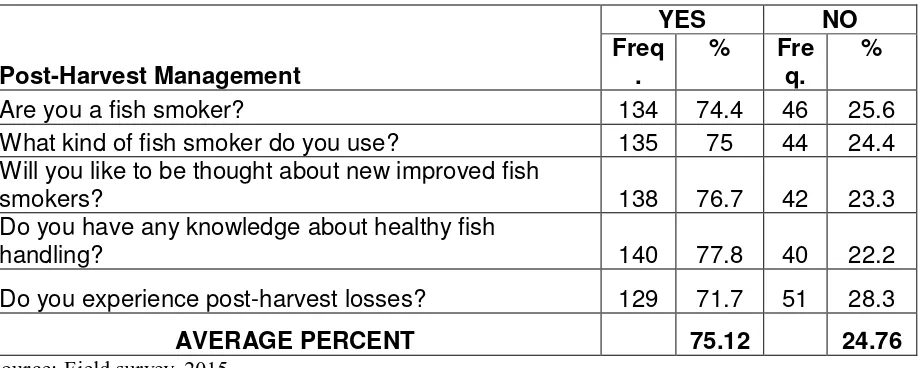SUSTAINABLE FISHERIES
MANAGEMENT PROJECT (SFMP)
This publication is available electronically on the Coastal Resources Center’s website at
http://crc.uri.edu
For more information on the Ghana Sustainable Fisheries Management Project, contact: USAID/Ghana Sustainable Fisheries Management Project
Coastal Resources Center
Graduate School of Oceanography University of Rhode Island
220 South Ferry Rd.
Narragansett, RI 02882 USA
Tel: 401-874-6224 Fax: 401-874-6920 Email: info@crc.uri.edu
Citation: Takyi, M., Buabeng, J., Antwi, H. (2015). Report on Needs of MSMEs in Elmina, Moree and Anlo. The USAID/Ghana Sustainable Fisheries Management Project (SFMP), Narragansett, RI: Coastal Resources Center, Graduate School of Oceanography, University of Rhode Island and Central and Western Region Fishmongers Improvement Association. GH2014_ACT012_CEW. 14 pp.
Authority/Disclaimer:
Prepared for USAID/Ghana under Cooperative Agreement (AID-641-A-15-00001) awarded on October 22, 2014 to the University of Rhode Island and entitled; the USAID/Ghana Sustainable Fisheries Management Project (SFMP).
Detailed Partner Contact Information:
USAID/Ghana Sustainable Fisheries Management Project (SFMP) 10 Obodai St., Mempeasem, East Legon, Accra, Ghana
Brian Crawford Chief of Party brian@crc.uri.edu
Najih Lazar Senior Fisheries Advisor nlazar@crc.uri.edu
Patricia Mensah Communications Officer patricia.sfmp@crcuri.org
Bakari Nyari Monitoring and Evaluation Specialist hardinyari.sfmp@crcuri.org
Don Robadue, Jr. Program Manager, CRC don@crc.uri.edu
Justice Odoi USAID Administrative Officer Representative jodoi@usaid.gov
Kofi.Agbogah
SNV Netherlands Development Oganization #161, 10 Maseru Road,
E. Legon, Accra, Ghana 233 30 701 2440
Donkris Mevuta Kyei Yamoah
info@fonghana.org Friends of the Nation Parks and Gardens Adiembra-Sekondi, Ghana 233 312 046 180
Peter Owusu Donkor Spatial Solutions
powusu-donkor@spatialdimension.net #3 Third Nautical Close,
Nungua, Accra, Ghana
Darkuman Junction, Kaneshie Odokor Highway
Headmaster residence, Sekondi College Sekondi, Western Region, Ghana 233 243 326 178
For additional information on partner activities:
CRC/URI: http://www.crc.uri.edu
CEWEFIA: http://cewefia.weebly.com/
DAA: http://womenthrive.org/development-action-association-daa Daasgift:
https://www.facebook.com/pages/Daasgift-Quality-Foundation-FNGO/135372649846101 Friends of the Nation: http://www.fonghana.org Hen Mpoano: http://www.henmpoano.org
SNV: http://www.snvworld.org/en/countries/ghana SSG Advisors: http://ssg-advisors.com/
ACRONYMS
CEDECOM Central Region Development Commission
CEWEFIA Central and Western Region Fishmongers Improvement Association CLaT Child Labour and Trafficking
DAA Development Action Association DSW Department of Social Welfare FoN Friends of Nation
SFMP Sustainable Fisheries Management Program SNV Netherlands Development Organization
TABLE OF CONTENTS
Acronyms ... ii
1.0 INTRODUCTION ...1
2.0 METHODOLOGY ...1
3.0 OUTCOME ...1
3.1 Total Number of Respondents...1
3.2 Competencies and Behaviors of MSMEs...1
3.3 Basic Knowledge in Accounting and Marketing ...2
3.4 Business Name ...3
3.5 Business Finance ...3
3.6 Health, Safety and Environment ...4
3.7 Marketing ...5
3.8 Pricing ...5
3.9 Record Keeping ...6
3.10 Post Harvest Management ...6
3.11 General Training Assessments ...7
3.11.1 Areas for Training ...8
4.0 CHALLENGES ...8
5.0 LESSONS LEARNT ...8
6.0 CONCLUSION /WAY FORWARD ...9
LIST OF FIGURES
Figure 1 Number of MSMEs ...1Figure 2 Fishing Activities...7
LIST OF TABLES
Table 1 Competencies and Behaviors of MSMEs ...2Table 2 Basic Knowledge in Accounting and Marketing ...3
Table 3 MSMEs Business name ...3
Table 4 Financial Knowledge about the Business ...4
Table 5 Health, Safety and Environmental Issues ...4
Table 6 Basic Marketing Practices ...5
Table 7 Pricing ...6
Table 8 Record Keeping ...6
Table 9 Post Harvest Management ...7
Table 10 Management Training ...8
1.0 INTRODUCTION
As part of the activities of the Sustainable Fisheries Management Project, CEWEFIA under Activity 4.8.3 Fisheries Value chain improvements and livelihoods in Western and Central Regions assessed the needs of selected MSMEs at Elmina in the KEEA Municipal Assembly, Moree in the Abura Asebu Kwamankese District of the Central Region and Anlo in the Shama District of the Western Region. The activity is to aid in identifying the training needs of selected MSMEs to inform capacity building strategy.
2.0 METHODOLOGY
Focus Group Discussion
Under the focus group discussion, the project team assembled the selected MSMEs and oriented them on the needs assessment tool.
Face-to-Face Interviews
After the orientation, the women were called individually and interviewed. This strategy was used because the team wanted every selected MSME to express herself freely, and enable the interviewers to probe further into the issues under discussion.
3.0 OUTCOME
3.1 Total Number of Respondents
This survey on Training Needs Assessment was carried out in three communities. A total of one hundred and eighty (180) MSMEs were selected from the three communities. Out of this number, 64 were from Elmina, 59 from Moree and 57 from Anlo. This is presented in Figure 1 below.
Figure 1 Number of MSMEs
Source: Field survey, 2015
3.2 Competencies and Behaviors of MSMEs
Fifty-one percent (51.1%) of the respondents had good knowledge about fish processing activities; 50. 6% had good financial understanding and commercial ability of their business whilst 39.4% had good communication skills (face- to- face with authorities and customers). Although these women were rated “good” in the above mentioned areas, it was not formal knowledge. The competency levels of the MSMEs are presented in Table 1 below.
64
59 57
Table 1 Competencies and Behaviors of MSMEs
Source: Field Survey, 2015
Recommendation
It is recommended that, all the MSMEs including those who already have the basics need to be trained to acquire the needed skills in financial management and also to be empowered to communicate outwardly with the authorities and customers.
3.3 Basic Knowledge in Accounting and Marketing
Table 2 Basic Knowledge in Accounting and Marketing
AREA VERY
PROFICIENT
PROFICIENT NEED TO
KNOW MORE
Freq. % Freq. % Freq. %
Calculating profit 52 28.9 99 55 29 16.1
Record keeping 17 9.4 62 37.8 101 56.1
Accessing loan from financial institution
21 11.7 68 37.8 91 50.6
Customer care and close of sales 16 8.9 108 60 54 30 Investment and growth of
Business
29 16.1 96 53.3 70 38.9
Packaging, Storage and Branding
48 26.7 62 34.4 70 38.9
AVERAGE PERCENTAGE 17 46.3 38.4
Source: Field survey, 2015
Recommendation
From the analysis, 38.4% MSMEs need to be trained on effective and efficient ways to run their fish processing business to earn profit. The MSMEs also need training in how to save and access loans from financial institutions and also to invest in diversified livelihoods to support them during the lean season.
3.4 Business Name
Majorities (92.7%) of the MSMEs do not have business names; the reason being that they normally operate directly from their houses and therefore do not see the need to name their businesses. Table 3 presents the responses from the MSMEs.
Table 3 MSMEs Business name
YES NO
Freq. % Freq. %
Name of business? 13 7.2 167 92.8
Source: Field Survey, 2015
Recommendation
MSMEs must be encouraged to have business names for easy identification by customers and to aid in registration.
3.5 Business Finance
Table 4 Financial Knowledge about the Business
FINANCIAL LITERACY YES NO
Freq. % Freq. %
Do you have knowledge about
Banking? 85 47 93 51
AVERAGE PERCENT 71.2 28.2
Source: Field survey, 2015
Recommendation
The MSMEs should be trained in simple book keeping to enable them keep records of their fish processing and other businesses. Furthermore those who do not know the importance of record keeping should be encouraged to keep records of their activities
3.6 Health, Safety and Environment
On the average 51.8% of the respondents have knowledge about health safety and environmental issues associated with their processing activities but do not have mechanisms in place to mitigate such unhealthy and unsafe environmental issues. Although 59.4% indicated that they had proper waste disposal sites, it was realized that they dumped their waste into the sea, rivers and lagoons. The by-products of the processed fish are however sold as poultry feed. 70.6% of the respondents do not use safety gears in their processing activities; which is a threat to their health. Most of them (82%) were ignorant of the effect of smoke on their health. The responses are presented in Table 5 below
Table 5 Health, Safety and Environmental Issues
HEALTH,SAFETY,ENVIRONMENT Freq. YES % Freq. NO %
Do you have any knowledge about health, safety and environmental issues
associated with your activities? 149 82 31 17
Do you have any mitigating measures in
place? 51 28.3 129 71.7
Are you aware of the effect of smoke on
your health and environment? 102 56.7 78 43.3
Do you use safety gears during your
activities ie fish processing and others? 52 28.9 127 70.6 Do you have first aid box at the place of
business? 51 28.3 128 71.1
Do you have a safe site for by-products? 111 61.7 69 38.3 Do you have a proper site for waste
disposal? 107 59.4 73 40.6
AVERAGE PERCENT 51.8 47.9 Source: Field Survey, 2015
Recommendation
MSMEs need to be trained in the use of protective gears for their processing activities to reduce workplace accidents. They should also be trained to keep a healthy and conducive environment at the processing sites and to adopt the appropriate risk-control measures.
3.7 Marketing
Sixty-six percent (66%) of the MSMEs have basic marketing skills. Seventy-seven percent (77%) know how to negotiate and set sales price; 75% know how to attract and maintain more customers whilst 67.2% have established target markets; mainly, Kumasi, Mankessim, Ho, Denu and Togo (Lome). On the other hand, 52.2% do not know how to close daily sales whilst 42.8% do not know their customer’s needs as they only sell the fish they get at the beaches. Table 6 presents the responses.
Table 6 Basic Marketing Practices
MARKETING/CUSTOMER CARE Do you have basic accounting knowledge and how to close
daily sales? 85 47.2 94 52.2
Do you have an established target market? 121 67.2 59 32.8
Do you want to expand beyond your established target market? 135 75 45 25
Do you look out for what customers want? 103 57.2 77 42.8 Do you know how to negotiate product price and set sales
price? 138 76.7 42 23.3
AVERAGE PERCENT 65.9 33.98
Source: Field survey, 2015
Recommendation
The MSMEs need training in how to expand their market beyond the target market as indicated by 75% of the respondents. Also, they need training in tailoring their fish products to meet customer needs.
3.8 Pricing
Table 7 Pricing
PRICING YES NO
Freq. % Freq. %
Do you use Crates, Boxes, and Pans, basket or weighing scale as a measure of pricing your
product? 123 68 56 32
Source: Field survey, 2015
Recommendation
It is recommended that, the MSMEs be trained in using weighing scales and modern techniques of pricing as a means of measurement in selling their fish.
3.9 Record Keeping
Averagely, 55% of the respondents do not know record keeping. Fifty-seven percent (57) have however thought of keeping records of their business activities whilst 48.9% know the importance of keeping records on their business. Table 8 presents the responses.
Table 8 Record Keeping
RECORD KEEPING
YES NO
Freq. % Freq. %
Do you know the importance
of records keeping? 88 48.9 92 51.1
Do you have records on your
business finances? 66 36.7 114 63.3
Do you keep records in
books or computers? 67 37.2 113 62.8
Have you ever thought of keeping records on all your
business activities? 102 56.7 78 42.9
AVERAGE PERCENT 44.9 55
Source: Field survey, 2015
Recommendation
We recommend that the MSMEs should be trained to keep proper records of their businesses.
3.10 Post Harvest Management
Figure 2 Fishing Activities
Source: Field survey, 2015
Seventy-seven percent (77 %) had knowledge in healthy fish handling but observation showed that they did not practice proper fish handling methods. Seventy-five percent (75%) use chorkor smokers in smoking their fish whilst 71.7% experience post-harvest loses due to spoilage of fish during processing, by animals, through pilfering, and loss of fish through burning. Fish caught using dynamite also gets spoiled during processing. Table 9 presents the responses.
Table 9 Post Harvest Management
Post-Harvest Management Will you like to be thought about new improved fish
smokers? 138 76.7 42 23.3
Do you have any knowledge about healthy fish
handling? 140 77.8 40 22.2
Do you experience post-harvest losses? 129 71.7 51 28.3
AVERAGE PERCENT 75.12 24.76
Source: Field survey, 2015
Recommendation
The MSMEs need to be taught on the use of improved fish smokers as indicated by 76.7% of the respondents; and on how to reduce post-harvest losses.
3.11 General Training Assessments
Majority (90%) of the respondents indicated that they had not received any training in Business Management. Only 10% of them had had some training in Book keeping, Calculating profit, Financial management, Proper fish handling and Investment of profit
74.4 25.6
Table 10 Management Training
Have you received any business management training
YES NO
Freq. % Freq. %
TOTAL 18 10 162 90
Source: Field survey, 2015
Respondents who had not received any Business Development training were asked to indicate whether they would like to be trained in Business Management. Ninety-seven percent (97%) of them answered ‘Yes’ whilst 3% were not interested in Business Development Training. This is presented in Table 11.
Table 11 MSMEs interest in Business Management Training
IF NO, would you
like to be trained
YES N0
Freq. % Freq. %
TOTAL 175 97 5 3
Source: Field Survey, 2015
3.11.1 Areas for Training
Those who requested for Business Development training proposed the following areas: Diversified livelihood
Investment Bookkeeping Savings/banking Financial management Health and safety Healthy fish handling Customer care
Calculating profit Credit management
Improved smoking technologies
4.0 CHALLENGES
Although some of the respondents requested to be trained, they did not know the type of training they needed. Almost all of them suggested that they needed a type of training that would be beneficial to the upkeep of their processing business
Negative attitude towards training; they felt they already had knowledge on the nitty-gritties of their processing activities
